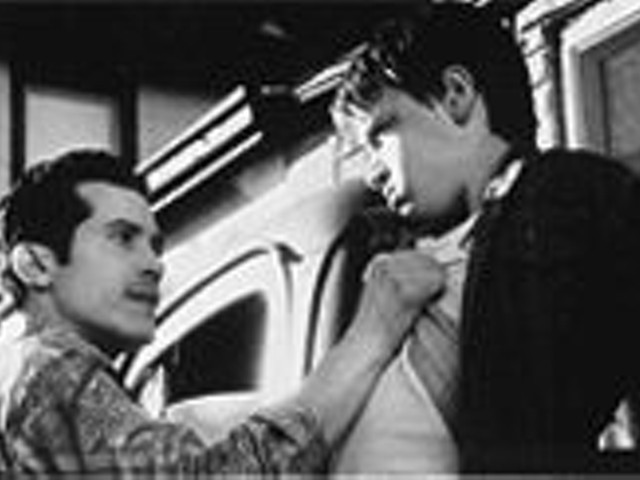I Stand Alone isn't an easy movie to like, unless you like being slammed in the gut with a bowling ball. As a date movie, it ranks right up there with the picture that Robert De Niro took the Cybill Shepherd character to see in Taxi Driver. It is a dark and genuinely disturbing movie experience, and one that is hard to shake off. As a director -- he also wrote and produced the film -- Noé isn't interested in half-measures or compromise. He drives all the way into the dark heart of his subject here, without making the slightest attempt to soften his vision or make his characters more palatable. And if all this were not alienating enough, he periodically -- and, it seems, arbitrarily -- interrupts the flow, à la Godard, with a musical blast that sometimes sounds like a boom, sometimes a bang.
The action takes place in Paris in 1980, but this is not Paris of the Eiffel Tower or the Champs Elysées but of Jean Genet, of sewers and pissoirs and slaughterhouses. During the film's opening segment, Noé brings those of us who didn't see the first installment of the Butcher's exploits up to speed with a brisk montage of the events that culminate in his relationship with a slovenly, porcine harpie known as the Mistress (played by the aptly named Frankye Pain). Soon after she and the Butcher meet, she gets pregnant, and they leave Paris to shack up with her old crone of a mother (Martine Audrain) in Lille. Their goal is to save enough money to buy a butcher shop of their own, so the Butcher gets a job working as a night watchman in an old-folks home.
With this new work, a new lover and the prospects of a new family -- he had deserted his daughter (Blandine Lenoir) from his first marriage some years back -- the Butcher allows himself to feel the tiniest hint of optimism over what could be a new chance at life. Before long, though, this prospect of a new life blows up in his face. At work, he has become friendly with a pretty young nurse, and after his shift one night he walks her home. Instead of going straight home from there, he spends the rest of the night in a theater watching porn. When he gets home, the mistress becomes enraged and orders him out of the house. What happens next is one of the most disturbing scenes I can ever remember seeing on a movie screen.
Much of what Noé puts up onto the screen in I Stand Alone left me feeling wrung-out and wasted. It is a powerful, devastating movie. What's most remarkable, though, is that this is Noé's first full-length feature. Two-and-a-half years in the making, I Stand Alone will have you in the grip of its overwhelming nihilism from the instant the lights go down. But even more impressive are the flashes of mordant comedy scattered throughout the film. In one hilarious scene, the Butcher tries out for a job at a nearby deli but fails because the proprietor wants him to be personable and smile at the customers. The guy just doesn't have any smiles in him. Not even one.
The collaboration between Noé and his lead actor, Philippe Nahon, is perhaps a one-of-a-kind phenomenon in that the actor never read the script or had any prearranged dialogue. In the part, Nahon shows traces of De Niro's Jake LaMotta, and like De Niro, he blurs the line between man and beast. Since this is a French film, Noé is sensitive to the Butcher as a symbolic figure, but he doesn't shove it down our throats, either. With an actor as skilled as Nahon he doesn't have to. As Cynthia, the Butcher's daughter, Blandine Lenoir has a straightforward simplicity that comes across as a direct counterpoint to the turgid rhetoric of the butcher's narration.
As the movie progresses toward its climax, and the action onscreen become increasingly extreme, Noé builds up a dizzying narrative pace. Just as soon as you think his vision can't get any darker, or more horrifying, he pulls out yet another stop. "Come into the world. Eat. Wag your bone. Give birth. And die. Life is a huge void. It always has been and always will be." It seems strange somehow to praise a movie with a vision so unremittingly bleak. Still, Noé's talent is undeniable. To remain faithful to that vision is, in the end, his greatest achievement. It is somehow truly uplifting.
Plays at 9:15 p.m. Nov. 5 and 8 p.m. Nov. 6-7 at Webster University.





